PrAACtical Questions with Vicki Clarke: What’s the Role of Core Vocabulary?
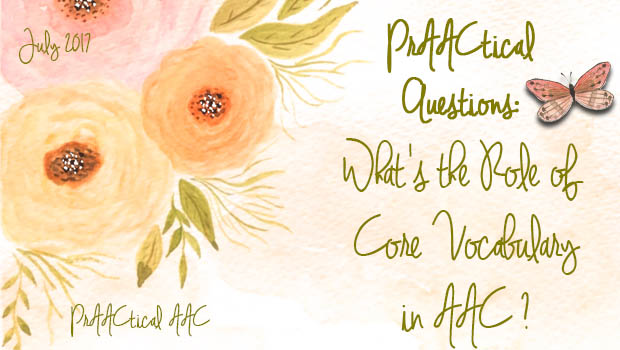
Today, we’re welcoming back Vicki Clarke, a Georgia-based SLP who has been specializing in AAC for over 25 years. Her practice, Dynamic Therapy Associates, serves children and adults with significant communication ch allenges in clinical and educational settings. Most of Vicki’s guest posts have been on the topic of assessment (click here to view them), but in this post, she shares her thoughts on the role of core vocabulary in AAC systems.
allenges in clinical and educational settings. Most of Vicki’s guest posts have been on the topic of assessment (click here to view them), but in this post, she shares her thoughts on the role of core vocabulary in AAC systems.
::::::::::::::::::::::::::::::::::::::::::::::::::::::::::::::::::::::::::::::::
I’ve enjoyed listening to the wonderful presenters at the AAC In The Cloud sessions last week. It’s exciting to see AAC knowledge being shared to such a wide and varied audience! Core vocabulary was a hot topic last week so I thought it would be a good time to chat about it! At conferences, in blogs, all over the internet and from your AAC specialists, you may have gotten the memo that Core Vocabulary is an important component of AAC. As a group of professionals, we have done a great job finally communicating that message clearly!
 Hurray!
Hurray!
Now that we all understand we need core words to learn to generate language, it’s time to go to the next level in understanding vocabulary/message selection for our children! Core vocabulary is one, very important, research-based method of presenting words and messages on an AAC system. There are tons of resources out there now for teaching core, so I won’t belabor the point- go take a look at these favorites of mine:
Core is important. We need it.
Okay, but what else do we need? The biggest weakness of AAC is the amount of time it takes to say something. The second biggest weakness is that it is difficult to say specifically what you want to say.  Core vocabulary helps us with some of these challenges in that it gives us the basic words we need to basically get our basic message across. “I want that.” “Not this.” “Like it.” “Not like it.” “I go.” “You do it.”
Core vocabulary helps us with some of these challenges in that it gives us the basic words we need to basically get our basic message across. “I want that.” “Not this.” “Like it.” “Not like it.” “I go.” “You do it.”
SPECIFIC NOUN VOCABULARY IN CATEGORIES
As you’ve probably heard, core vocabulary consists of approximately 80% of the words we use. But what about the other 20%? What if you didn’t have the word “coffee” on your device? I don’t know about you, but I wouldn’t be writing this article because I wouldn’t be functioning (or at a minimum, I would be grumpy). So we know, in Vicki’s world, “coffee” needs to be on the device. Also Chuck, Ashley, Alex, Penni, Mom and Dad, because those are My People (and dog). And I couldn’t live without Dunkin Donuts, Dynamic Therapy, Crossfit, Destin, Publix, Walmart (I know..) and Walgreens. Let’s also add doughnuts, bacon, farm fresh eggs, steak and Cape Cod 40% Reduced Fat Original Kettle Cooked Potato Chips.
For some of our emergent communicators these specifics are even more important than they are to me. We know our children need to be motivated to communicate in order to be successful. Let’s face it, specific words are simply more interesting to communicate. When we are getting that initial “buy in” to the value of communication, you can’t often beat a good specific word, say “Goldfish!” Specific terms also are more concrete, so that’s helpful (not IMPERATIVE FOR ALL, but often helpful for some).
None of this is to say that a child only needs specific nouns. Absolutely not! But they DO need to be available, and for some of our children, specific nouns is where we start. That being said,
Even if specific nouns make the most sense to the child, you still want to expose, model and teach core words!
CONTEXT BASED MESSAGING
Now, on to another research based method of organizing our messages. Context based messaging is simply looking at a child’s typical  environment and providing the routine messages and words that are required in order for him to communicate effectively (and efficiently). When we carefully document the environment we call this an “ecological inventory,” for those of you wanting to be fancy. Having context based messages is NOT the same as having pages and pages of activity based words. Contexts/environments/topics which occur frequently in a child’s life are critical places and times he needs to be able to communicate daily. We aren’t talking about Potato Head and Play-Doh. We are talking about Bathroom, Meal Time, Living Room and Riding in the Car. Each of these environments is encountered every day, and has the opportunity for communicating exactly the same messages each time. “How much longer?” “I need to go to the bathroom!” “What’s that?” “Where are we going?” “She’s ON MY SIDE!” are messages you might hear every time you are in the car with your child. Does it make sense for your child to select each individual word (and navigate to the specifics) to say these messages? Remember that time issue AAC users have? Having some well thought out, repeatable messages associated with routine contexts/environments/topics is a way to allow our child to be EFFICIENT.
environment and providing the routine messages and words that are required in order for him to communicate effectively (and efficiently). When we carefully document the environment we call this an “ecological inventory,” for those of you wanting to be fancy. Having context based messages is NOT the same as having pages and pages of activity based words. Contexts/environments/topics which occur frequently in a child’s life are critical places and times he needs to be able to communicate daily. We aren’t talking about Potato Head and Play-Doh. We are talking about Bathroom, Meal Time, Living Room and Riding in the Car. Each of these environments is encountered every day, and has the opportunity for communicating exactly the same messages each time. “How much longer?” “I need to go to the bathroom!” “What’s that?” “Where are we going?” “She’s ON MY SIDE!” are messages you might hear every time you are in the car with your child. Does it make sense for your child to select each individual word (and navigate to the specifics) to say these messages? Remember that time issue AAC users have? Having some well thought out, repeatable messages associated with routine contexts/environments/topics is a way to allow our child to be EFFICIENT.
Is there more? Of course!
TEXT TO SPEECH- SPELLING- KEYBOARDS
Like all those noun categories, having the ability to be specific is important. Keyboards and spelling cannot be beat for allowing a person to be specific. Literacy development is paramount for our AAC users, and you can’t learn to spell if you don’t have access to letters- so let’s make sure there’s a keyboard on board.
As with all such subjects, the black and white discussion of CORE versus PHRASES is a silly simplification of how we select and organize vocabulary for our kids. A little of both, and some other extras are really what we need.
One size does not fit all and everyone likes a little variety in their closet!
OR
We all need plain old underwear (core) but rainbow tie-died Lularoe leggings (specific nouns) that keep you warm when it’s winter (context based) are pretty darn important too!
Filed under: Featured Posts, PrAACtical Thinking
Tagged With: core vocabulary, vocabulary selection
This post was written by Carole Zangari

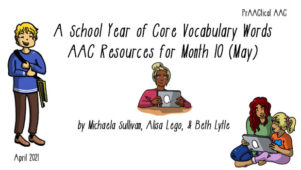
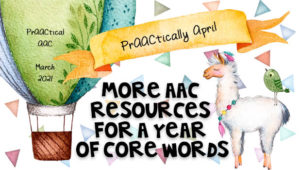
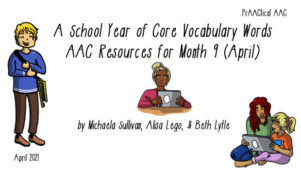
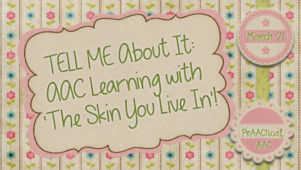
3 Comments
The timing of your post is uncanny. Last week I decided I was going to add more phrases to our core system, for exactly the reasons you stated. I was discussing this our SLP on Friday and I was so relieved she agreed. I think the important thing in AAC is to be flexible and tailor the system for the user and their support team. I am hopeful that my daughter will benefit from having both core and some well placed phrases in her system.
Yes! Rarely is there one answer to how messages should be organized! We are all multi-modal communicators and that goes for the words we use too!
Thank you for this post! Would you be able to cite some articles supporting use of core words with AAC users? thank you!